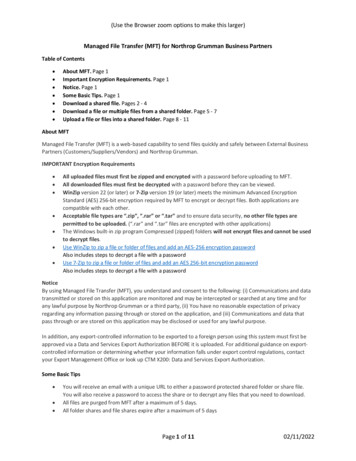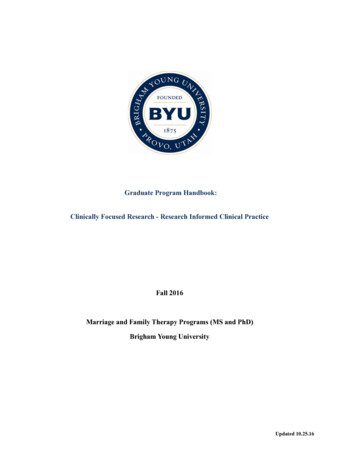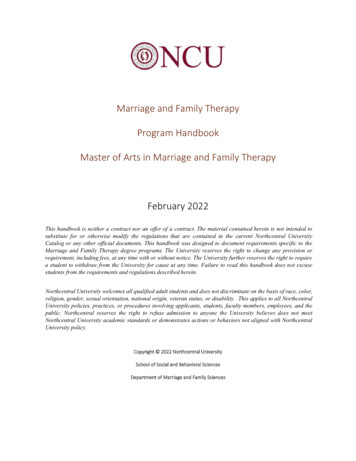
Transcription
THE MFT PROGRAM MANUAL:GENERAL ORIENTATION AND ACADEMIC ADVISEMENTUW-Stout Marriage and Family Therapy Master’s ProgramUniversity of Wisconsin-StoutMenomonie, WI 54751Revised, January 2020
TABLE OF CONTENTSIntroductionAccreditation HistoryCore FacultyMission, Program Goals, and Student Learning OutcomesMission of the MFT ProgramProgram Goals and Student Learning OutcomesCurriculum and InstructionThe Student ExperienceAssumptions Regarding Faculty and StudentsWhat the Program Offers and What it Cannot GuaranteeThe Cohort Model and Systemic Dynamics Among ClassmatesRole of the Student as it Concerns the Group ProcessRole of the Instructor/Supervisor as it Concerns the Group ProcessA Special Note on Power, Privilege, and DifferenceUW-Stout Racial Minority Services and MFT Program MentoringProgram GovernanceGovernanceStudent Governance CommitteeProgram EvaluationPolicies and ProceduresAnti-DiscriminationRecruitmentAdmission ProceduresGrading and AssessmentAuthenticity of Student WorkStudent Review/Retention/DismissalComplaints and GrievancesInability to Complete Program as a Full-Time StudentLimits of Student/Supervisee ConfidentialityTechnology RequirementsTechnical Training for Students, Faculty, and SupervisorsPreparing for PracticumFirst Year ObservationsTransitioning into PracticumSecuring an Off-Campus PracticumStarting Practicum Early/LateAAMFT MembershipGraduationApplication for Degree Candidacy and GraduationCommencementBeyond GraduationState MFT LicensingMinnesota/Wisconsin 15151717171818181919192021222222222224
License Portability to Other StatesContinuing EducationTypes of Employment to Seek Upon Graduation and Prior to LicensureUniversity of Wisconsin – Stout Placement ServicesA Final Note to Our GraduatesAppendicesAppendix A: Mission, Program GoalsAppendix B: Program Director Position DescriptionAppendix C: Readiness to Advance FormAppendix D: Affiliation Agreement Forms324242525252627303233
INTRODUCTIONWELCOME to UW-Stout’s Marriage and Family Therapy (MFT) Graduate Program, a program with deepMFT roots. Accredited in 1977, it is one of the first MFT programs in the country and one of only twoprograms to have continuously maintained its national accreditation over this period of time. In fact,UW-Stout has graduated over 500 MFT students during the last 40 years, many of whom have gone onto become leaders in their profession and communities. We welcome you to the program and lookforward to your success.We believe the strength of the UW-Stout MFT program is due to its having quality faculty and facilities.It also receives strong support from the university at large. However, these qualities exist in manyprograms and are not unique to this program. The specific factors that make this program unique are:(1) it is a COAMFTE accredited program, (2) it attracts high quality students due to its solid reputationand long-standing accreditation, (3) the student’s educational experience is augmented through the useof a “cohort” design that adds a more personal dimension to the education, and (4) all students workwith clients at an on-campus clinic where they receive direct supervision from the MFT faculty, all ofwhom are either Approved Supervisors through the American Association for Marriage and FamilyTherapy (AAMFT), or Supervisor Candidates. It is rare to find this combination of features in a master’slevel training program. The most important reason for the program’s excellent reputation, however, isthe outstanding quality of work that is done by its graduates as witnessed by employers, colleagues andthe people they serve. The program’s reputation stands on the shoulders of its graduates.Undoubtedly, the prospect of working toward an advanced degree creates in some students a concernabout the high expectations the program faculty members have of them. As students proceed throughthe program it is important for them to understand that they have been admitted because the programselection committee believes they have the “right stuff” to become excellent therapists. The program’shigh retention/graduation rate documents that the program’s faculty and staff are as invested in eachstudent as the student is invested in the program. It is our hope that, by working together, the student’stime at UW-Stout becomes one of the more extraordinary experiences of her/his professional career.This manual is intended to clarify the program’s objectives and to guide students through the academicportion of the program. The first year in the MFT program is generally referred to as the “AcademicYear” because all of the student’s academic credits are devoted to course work. The second year isreferred to as the “Clinical Year” because, although students still take classroom courses, most time isspent in the practicum courses. This involves seeing clients and working in clinical teams withclassmates. A separate “Practicum and Clinical Service Center Manual” guides students through thisportion of the program. Because of this, terms such as “students,” “therapists,” “classmates,” “peers”and “colleagues” are used interchangeably to refer to “student therapists in training.” It is also thefaculty's belief that the best academic and clinical training will be achieved through adherence to theCOAMFTE accreditation standards and the AAMFT Code of Ethics,. The program’s curriculum is basedon it.Accreditation History.Officially designated as a “Marriage and Family Therapy” master’s program by the University ofWisconsin System in 1974, the “Committee on Accreditation” granted the UW-Stout program candidacystatus in 1975 and full accreditation status in 1977. The professional organization was then known asthe “American Association of Marriage and Family Counselors” which became AAMFT in 1978. In 1978,the Committee on Accreditation was renamed the Commission on Accreditation for Marriage and Family4
Therapy Education (COAMFTE). The program has maintained full accreditation status throughout thishistory and is the second longest accredited program in COAMFTE’s history. Brigham Young is the onlyMFT program with a longer accreditation history. This demonstrates UW-Stout’s long-termcommitment to providing top-level MFT training. The program is currently accredited through October,2022.CORE FACULTYCore faculty at UW-Stout are faculty whose primary professional identification is as a couple and familytherapist. They must teach at least two classes per year in the program, be a member of AAMFT, and bean AAMFT Approved Supervisor or Supervisor-in-Training. Core faculty have the responsibility of makingdecisions regarding the curriculum and clinical training of the program and are collectively responsiblefor guiding the progress of students in the program. Core faculty include:Dale Hawley, PhD (University of Minnesota)Dale Hawley is Director of the Marriage and Family Therapy program at UW-Stout. He has been on thefaculty of Stout since 2002 and previously taught in the Marriage and Family Therapy program at NorthDakota State University. He also has a background in pastoral care and ministry and enjoys working withcouples and with people in ministry settings in his private practice. His research interests include familyresilience and families living in cross-cultural contexts. Dr. Hawley is a Licensed Marriage and FamilyTherapist (LMFT) and an AAMFT Approved Supervisor.Terri Karis, PhD (University of Minnesota)Terri Karis is a Professor and AAMFT Approved Supervisor in the Marriage and Family Therapyprogram at UW-Stout. She has taught at Stout since 2000 and previously worked in residential, daytreatment, community mental health and employee assistance settings. Her clinical interests includetrauma-informed treatment, mindfulness, racial and cultural issues and somatic therapies. Dr. Karis isboth a Licensed Marriage and Family Therapist (LMFT) and a Licensed Psychologist (LP) and maintains aprivate practice in Minneapolis where she enjoys doing clinical supervision and working with individualsand interracial and intercultural couples.Candice Maier PD (University of Iowa)Candice Maier is an assistant professor of Marriage and Family Therapy and Human Development andFamily Studies. She is an AAMFT Clinical Fellow, Supervisor, Family Therapy Section Officer (Student NewProfessional) and Affiliate Councils Student Advisors Representative for the National Council on FamilyRelations (NCFR). She has presented and written on couple relationships and contributions to mentaland physical health outcomes and feminist/social justice theories. Candice is a practicing clinician andhas a passion for narrative therapy.Anne Ramage PsyD (University of St. Thomas)Anne Ramage is an adjunct faculty member in the Marriage and Family Therapy Program at UW-Stout.She has a Doctorate in Counseling Psychology, is an AAMFT Approved Supervisor, and is licensed inMinnesota. Anne has been a therapist for over 30 years and currently owns a private practice in theHighland area of St. Paul. Her clinical interests include mentoring therapists who wish to becomeAAMFT Approved Supervisors as well as helping individuals seeking post-degree supervision. Anne isalso interested in trauma-related therapy as well as psychometric testing, receiving referrals from othertherapists related to testing their clients. In addition to UW-Stout, she teaches graduate Family5
Psychology classes at the University of St. Thomas. She also holds licenses as a Marriage and FamilyTherapist and a Clinical Social Worker in Wisconsin.Markie Twist PhD (Iowa State)Markie Louise Christianson (L. C.) Twist (she/her/they/them), is the Program Coordinator of theGraduate Certificate in Sex Therapy Program, and Professor in the Human Development and FamilyStudies Department and Marriage and Family Therapy Program at the University of Wisconsin-Stout. Dr.Twist is also a licensed marriage and family therapist and mental health counselor, as well as a clinicalfellow and approved supervisor of the American Association for Marriage and Family Therapy, andcertified sexuality educator and supervisor through the American Association for Sexuality Educators,Counselors, and Therapists. Dr. Twist also serves as the Editor-in-Chief of Sexual and RelationshipTherapy: International Perspectives on Theory, Research and Practice. To learn more about Dr. Twistvisit: drmarkie.com.MISSION, PROGRAM GOALS AND STUDENT LEARNING OUTCOMESAs a program we are committed to training new marriage and family therapists who can impact the livesof people in their communities and can influence the field. This is an intensive program but it isgratifying to see the mark that graduates make on the lives of others. Our mission helps us stay oncourse with this commitment while the goals and outcomes of the program help us achieve the mission.Mission of the MFT Program.The mission of the MFT program is to assure that graduates are competently trained to become entrylevel professional couple and family therapists. The program promotes a systemic-relational MFT clinicalorientation, utilizes a combination of academic and experiential methods of training, and addresses therole of power, privilege, and inclusivity in therapy.Program Goals and Student Learning Outcomes. In order achieve this mission, a number of programgoals and associated student learning outcomes (SLO) have been set. These outcomes are tracked on aregular basis and are used to assess the progress of the program and to make needed improvements.Program goals and student learning outcomes associated with each are listed below; details regardinghow these outcomes are measured can be found in the Appendix A of this handbook.Program Goal 1: Knowledge. The program will help students/graduates achieve a clear understanding ofprofessional marriage and family therapy principles to support them as they enter the field as practicingprofessionals.SLO 1: Students/graduates will demonstrate knowledge of principles underlying couples andfamily therapy including theoretical models, dynamics of couple/family interaction and humandevelopment, trauma, diagnosis and assessment, and psychological testing.Program Goal 2: Practice. The program will help students/graduates develop systemically-based clinicalskills.SLO 2: Students/graduates will exhibit clinical skills necessary for the practice of couple andfamily therapy including the use of self in therapy, clinical assessment and diagnosis, treatment6
planning and management, assessment of potential for harm to self or others, and therapeuticintervention.SLO 6: Students/graduates will complete the program and enter the field as couple and familytherapists.Program Goal 3: Inclusivity. The program will help students understand and apply knowledge of power,privilege, and oppression as they relate to categories of difference.SLO 3: Students/graduates will demonstrate an awareness of power, privilege, and differencewithin therapeutic and supervisory contexts.Program Goal 4: Research. The program will help students/graduates become competent consumers ofresearch so they may maintain empirically informed practices.SLO 4: Students/graduates will demonstrate a clear understanding of how research can beapplied to clinical practice.Program Goal 5: Ethics. The program will help students/graduates learn and apply ethical standardsconsistent with the practice of couples and family therapy.SLO 5: Students/graduates will demonstrate an applied knowledge of ethics, legalities, andprofessional standards related to the practice of couple and family therapy.CURRICULUM AND INSTRUCTIONThe MFT program at UW-Stout is a two-year, full-time, cohort-based model. A new cohort begins eachFall semester and students take all courses with members of their cohort. Exceptions can be made ifstudents are transferring courses from previous graduate work. All campus work is done on Mondayand Tuesday. This is done to accommodate students who travel to Menomonie from a distance. Tocomplete their course work in two days, some students make arrangements to stay overnight inMenomonie. Since the program is full-time, these days are long. During the first year students canexpect to be on campus from approximately 9:00 am-5:00 pm each day. During the second year whenthey are working in the on-campus clinic students can expect to be on campus from 1:00 pm-9:00 pm,on Mondays and 9:00 am-9:00 pm on Tuesdays.The MFT course sequence (see below) is designed to meet COAMFTE and state licensing standards andcannot vary. This curriculum provides the student a broad and solid foundation from which to operateas an entry level MFT professional upon graduation. When planning/registering for courses, specificthings students must pay attention to are: Courses are offered once a year. It is most expedient to take them as listed below. Variancefrom this format is strongly discouraged as it could delay transition into practicum and/ordisrupt the ability to graduate from this program. One half of the class will take MFT 795 the summer between their first and second year, theother half will take it the following summer.7
In the fall and spring semesters of the second year students register for two sections (4 creditseach, 8 credits total) of the MFT practicum courses (Note: there is only one section of summerpracticum (3 credits)). These requirements are subject to change if students transfer credits from another institution. All UW-Stout registration information is found ecords/class-registration-and-credit-load. Students must becomeproficient with these processes.The normal sequence of courses is:Year OneFall semesterMFT 740MFT 750MFT 752MFT 762Total3 credits3 credits3 credits3 credits12 creditsPower, Privilege, and DifferenceFoundations in Couple and Family TherapyCouples TherapyDiagnosis in Family TherapySpring semesterMFT 7412 creditsMFT 7453 creditsMFT 7513 creditsMFT 7533 creditsMFT 7553 creditsTotal14 creditsCulturally Responsive Couple and Family TherapyTrauma Informed Approaches to Violence and AddictionsContemporary Couple and Family TherapyChild and Adolescent TherapyProfessional IssuesSummer semesterHDFS 7423 credits1HDFS 7301 credit1MFT 7331 creditMFT 7953 creditsTotal5-8 creditsLifespan Individual and Family DevelopmentAdvanced Human Sexuality1Advanced Sex Therapy1Practicum (half of cohort)Year 2Fall semesterMFT 744MFT 793Total2 credits8 credits10 creditsPsychometric AidsPracticum (two sections of four credits each)HDFS 730 and MFT 733 are variable credit courses. Students completing the Sex Therapy Certificatewill complete all credits of these courses. Students not completing the Sex Therapy Certificate will takeonly one credit from each of these courses.18
Spring semesterMFT 7653 creditsMFT 7948 creditsMFT 7751 creditTotal12 creditsSummer semesterMFT 7953 creditsResearch in Marriage and Family TherapyPracticum (two sections of four credits each)CapstonePracticum (half of cohort)THE STUDENT EXPERIENCEBeing a student in the MFT program at UW-Stout is a unique experience. The cohort model, the oncampus clinic, and the relatively small number of students admitted each year are several vital elementsthat contribute to the success of the program. We receive consistently positive feedback from graduatesand employers regarding the quality of the program. While an important part of the educationalexperience is based on gaining new concepts and the supervised experience of working with clients,much of the value of this learning experience rests on relationships developed with faculty, supervisors,and fellow students.Assumptions Regarding Faculty and Students.A successful education is the result of instructors and students working together to create a meaningfullearning experience. Toward this end, students can expect that their instructors, supervisors, facultyand support staff will be well trained, punctual, prepared, professional and personable. Course materialwill be up-to-date, well-presented, and the content will be appropriate to the profession of MFT.Instructors will respect each student's unique abilities and aspirations. At the same time, students areexpected to immerse themselves in the course material, come to each class prepared, collaborate withpeers, faculty and staff (including accepting criticism and offering constructive feedback), and make thenecessary commitment of time (attendance) to the program. All students must regularly check theirUW-Stout email account so as not to miss important university and program announcements/deadlines.Students are also expected to, if necessary: actively and independently pursue remediation in areas of weakness;actively pursue consultation or supervision regarding problem areas in their academic andclinical work; andpursue individual, marital and/or family therapy as deemed appropriate and valuable. (The UWStout Counseling Center provides therapy at no cost to students. The supervisors can also helpidentify therapists in the area, should this assistance be requested. However, they will notprovide therapy to students as this would constitute a multiple relationship and violateprofessional ethics).What the Program Offers and What it Cannot Guarantee. The UW-Stout MFT program offers studentsa solid MFT training experience. It uses the COAMFTE accreditation process to regularly assess itselfwith regard to how well its students master the clinical competencies necessary to be successful as9
entry-level professional marriage and family therapists. Toward this end, accreditation requires that theprogram consistently evaluate its graduates’ success rates in such areas as graduation, employment, andpassing the AMFTRB national exam. This data is used to make adjustments in training as necessary.While program evaluation data indicates that our graduates do exceptionally well in these categories,the program cannot guarantee 100% success. There are too many uncontrolled variables that come intoplay, such as personal health/family life stressors on the part of the student as they go through theprogram, variations in the economy and job market, and the amount of time that passes before agraduate takes the national MFT exam or applies for state licensure. Furthermore, states requireemployers to conduct background checks of personnel who will be working with vulnerable populations(e.g.: children, the elderly, developmentally disabled, etc.). Graduates who have related criminalbackgrounds (esp. those involving any kind of violence, abuse, theft, exploitation) may find limitedemployment opportunities. The student must be willing to accept these uncertainties when beginningthe program.The Cohort Model and Systemic Dynamics Among ClassmatesApproximately fourteen students are admitted into the MFT Program each year and will attend mostcourses together. This cohort design is intentional and is one of the most important aspects of thestudent’s educational experience. Most of the group process will be smooth. However, differences ofopinion often emerge as classmates debate theory, technique and life in general. This is normal amongany group of people and is reflective of the many ways human difference plays out in relationships.Becoming a systems therapist involves helping clients become more effective in interpersonalrelationships. Likewise, MFT students will have opportunities to apply what they learn about relationalprocesses to their own group. Toward this end, instructors/supervisors will sometimes initiate groupexperiential exercises in order to demonstrate a therapeutic process or to provide a learningopportunity to the entire group.While it is sometimes fun to compete to see whose ideas are going to be the most "correct" or"brilliant," repeated involvement in one-up/one-down interactions with peers can escalate to the pointof being frustrating and counter-productive. During the clinical year, such activities as choosing partnersfor co-therapy, negotiating treatment plans and giving/receiving feedback will sometimes lead tomoments where tension and dissension come to the forefront. Rest assured that differences of opinionare likely to occur between classmates. It happens in every cohort and is a normal part of any groupprocess. How students respond to these differences is the most important thing. In short, students areexpected to practice what they preach. Some patterns will become evident in the classroom during theacademic year, but they may intensify during the clinical year as a part of the co-therapy/groupprocessing dynamic. As students become familiar with one another they will both support and challengeeach other. Support is nice, but classmates will have various tolerances for challenge. Some mightavoid receiving a challenge. Others will avoid giving one. Yet, just as it is limiting to be the one who isalways in the “approach” role, it is also limiting to be the one who is always in the “avoid” role. Eachstudent is encouraged to strive to balance these roles by staying connected with her/his/their ownthoughts and feelings while staying connected with his/her/their classmates (even the ones theyconsider difficult).The MFT supervisors have found that this inevitable interpersonal crucible has the potential to facilitatetremendous self-of-the-therapist growth in students. It is rare that a student proceeds through theprogram emotionally-psychologically disconnected from their classmates. The class will form an identityand many students will emerge from the process personally changed and having formed lifelong10
connections to one another and to the program. We encourage every student to take advantage of thisprocess. The following guidelines are designed to help facilitate a positive outcome.Role of the Student as it Concerns the Group Process The MFT supervisors view you as skilled and mature people. When a difference of opinionemerges between you and your classmate(s) we expect you to attempt to resolve it on yourown. Speak on your own behalf. Don’t wait for one of us to intervene. (see “Role of theInstructor/Supervisor” below).Use good communication skills (accurate reflective listening, speak only for yourself using firsthand information and making “I” statements).If you have an issue with a classmate, instructor or supervisor, talk with that person face-to-facerather than attempt to tip the power balance to your side by triangulating clients, classmates,teachers, supervisors or staff into the conflict. In short, do not gossip or team up againstsomeone!Give honest feedback that is direct yet kind. When receiving feedback, reflect on anydefensiveness you feel in order to learn more about yourself.Find a way to stay receptive to feedback that you find difficult to hear. E.g.: practice selfregulation.Own your contribution to the interpersonal process being played out. When you are certainthat your colleague is the problem, it is time to reflect on your contribution to the problempattern (i.e.: second-order cybernetics -- you are a part of the system).Maintain a professional, respectful and nonjudgmental stance toward one another. Assumethat your classmates are guided by good hearts even though their method may be contrary toyour preferred style. Try to see how people’s protections are only part of who they are.Accept that group members have different expectations, methods and schedules when it comesto personal and group development. Each is on her or his personal timeline and trajectory.While you will obviously form subsystems of friendships and alliances within your group,practice sensitivity to inclusion and being open to and involved with everyone in your group.Work collaboratively.Be sensitive to issues of power and privilege within your own group. Make room for everyone’svoice to be heard in your group processes. Regard every person in your group as a facilitator ofyour learning.Know that learning comes as a result of one another’s differences and that this is the essence ofpracticing cultural responsiveness. One criterion for admission into the program is the diversitystudents can provide each other. Take advantage of it. Reach out to intersect/bridge gaps.Use your knowledge and creativity to frame your message in a way that it can be heard andconsidered useful.If you have difficulties that interfere with your ability to be successful, seeking your own therapyoutside of the MFT program is appropriate and respected.Role of the Instructor/Supervisor as it Concerns the Group Process In general, when differences ofopinion and/or tension emerge within the group process, an instructor/supervisor will only intervene ifthey determine it (a) is disruptive to the class, (b) is disruptive to therapy, or (c) involves them directly.In fact, an instructor might not even share a particular student’s idea of what constitutes a “problem.”11
Usually, when students are having an interpersonal difference that needs to be bridged, theinstructor/supervisor will view this as a growth opportunity and expect that the students will takeresponsibility for resolving the situation themselves using the guidelines specified above. However, if animpasse does occur that the students seem unable to resolve, the person(s) directly involved shouldrequest help from the course instructor/supervisor (who sometimes might not be aware that such animpasse is occurring). At this point the instructor/supervisor will facilitate student interaction but willnot take sides or prescribe what is right or wrong except in situations where established professionalethics, legalities or academic conduct might be violated.Finally, while most cohort issues are resolved using the larger group process, there are some issues astudent might not want to address in the presence of a classmate. When this occurs, an instructor orsupervisor may be designated to work individually with the student while consulting with otherinstructors, supervisors or support staff as appropriate. If it seems therapy would be useful, the studentwill be encouraged to attend outside of the program in order to maintain appropriate boundariesbetween the student and the program faculty/staff. Thus, it is important for the larger cohort torecognize that due to confidentiality and personal discretion they are not likely to know everything thattheir classmates and instructors are working on. It may seem at times that the training team orclassmate is not attending to an issue when in fact they are.A Special Note on Power, Privilege and Difference. This program provides a learning context in whichinclusion, equity and non-discrimination are addressed, practiced and valued. Because the University ofWisconsin-Stout is located in rural northwestern Wisconsin, it consists primarily of white students andfaculty. However, we value diversity and seek to admit students who are diverse in many ways. Peoplerepresenting such diversity are encouraged to apply to the program. Because MFT is relational/systemicin its focus, we are aware of how inequities that occur between people can directly impact their success.As such, the MFT program faculty work hard to provide a supportive learning environment for allstudents, and our graduates tell us that we generally succeed at this.UW-Stout Racial Minority Services and MFT Program Mentoring. Because of the small cohortcombined with UW-Stout’s location, racial minority students sometimes find that they are the “onlyone” in the cohort. We are sensitive to this process and work to help all students feel adequatelyaffirmed. Toward this end we encourage students to become involved with UW-Stout’s MulticulturalStudent Services Center ex.cfm). It has served asan important resource to our students over the years. Also, the MFT program itself has a sizable pool ofgraduates from a variety of backg
UW-Stout Marriage and Family Therapy Master's Program University of Wisconsin-Stout Menomonie, WI 54751 Revised, January 2020 . 2 TABLE OF CONTENTS . Undoubtedly, the prospect of working toward an advanced degree creates in some students a concern about the high expectations the program faculty members have of them. As students proceed through











